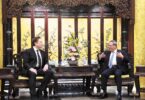The local bodies could not take root in Pakistan’s political system, and diverse experiments of past rulers from President Ayub’s Basic Democracy to General Zia’s local body governments, from President Musharraf’s devolution of powers to Municipalities to current day revision of the British era’s Petwars and Tahsildar rule by the so-called feudal politics, all such endeavours stopped short of full filling public demands over the past seven and a half decades. Multiple efforts failed to bring the desired results largely due to the prejudice and impaired application of those systems by politicians and bureaucracy. At the time, no local government existed in any of the federating units and the Federal capital because no civic group from across the political spectrum intended to decentralize the power and devolve authority due to its vested political interests. Meanwhile, each political leader and party has its view and appreciation the 18th Amendment and Article 140-A of the Constitution. Henceforth, democratically elected public leaders obstruct the devolution of power to the grassroots level and resist the autonomy of the local bodies which is contrary to the essence of democracy and public service in the contemporary age.
As of now, local governments play a crucial role in addressing the fundamental needs of communities, fostering development, and ensuring efficient public service delivery. By decentralizing powers, local governments bring decision-making closer to the people, allowing for tailored solutions to local challenges. This results in improved infrastructure, better healthcare, and enhanced educational facilities, directly benefiting the public. Citizens appreciate the accessibility of local representatives who understand their concerns intimately, while a majority of public issues are resolved at the local level without any delay which brings utmost comfort to the common citizen. In the modern local government system, patwari, and police either come under the control of district governments or functions under the Justice Department that enhance efficiency and curb corruption in those departments. However, such a pro-public system does not suit political parties as it bars the administrative powers of the MNAs and the MPAs and allows them only their primary legislative role at the provincial and federal levels.
Historically, the local bodies’ elections had always been a matter of concern for all political parties due to their malignant interests regarding the vote bank and political influence in their respective electoral Districts. The local bodies form a breeding ground for political groups and each party intends to instate its workers in lucrative positions so both party and leader improve their image through public work on public expenses. Awfully, no political party ever voiced in support of such a local government system that empowers the masses and fulfils their needs to the optimum level, rather feudal politics always upheld its communal interest and tried to slash the powers and curb funding to the local bodies. Although, the 18th Amendment and Article 140-A advocate for the devolution of authority and autonomy of the local bodies’ governments to enhance public participation in decision-making processes and ensure transparency in governmental affairs, yet civic groups and political leaders oppose stable local governments and fear risks to their authority.
Pakistan houses the world’s fifth-largest population and has little semblance of local government with only four provinces representing over 240 million people. The successive governments made no sincere efforts for political decentralization, rationalisation of powers, and greater autonomy of grassroots-level democracy in the country. World nations are mulling conquering Mars and the Moon while Pakistani rulers are focused on subjugating the public to boost their politics. There is a genuine need for the devolution of power and strengthening of local bodies so the people can benefit from the true dividends of democracy in this country.







